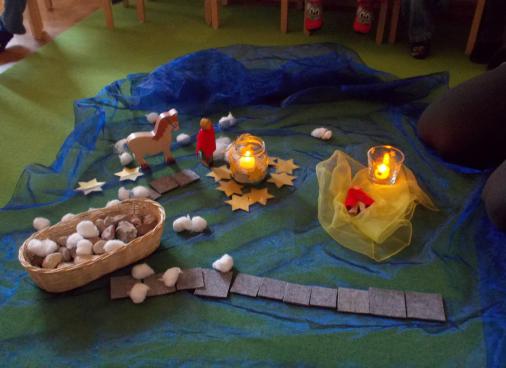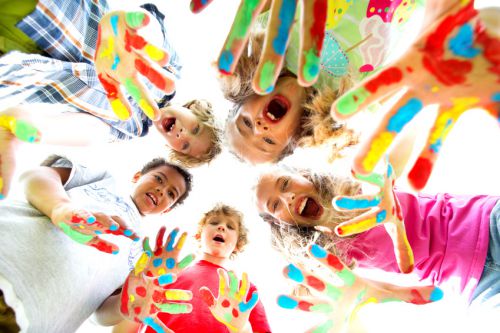WE’VE MOVED!
Since our old daycare center is getting old and we are waiting for the new one, we currently live in the Bibert elementary school. We are happy about the friendly welcome and the opportunity to use the classrooms.
Please click on the appointment button to see our annual planning.
Our daycare center in Wintersdorf was built in 1977 by the city of Zirndorf, and the Arbeiterwohlfahrt district association Fürth-Land e.V..
We are a facility for 78 (max. 80) children aged 2.5-10 years. We work partially openly, which means that our children have their own regular groups and can decide for themselves whether they would like to take part in cross-group offers. There are targeted educational offers in the groups every day, which are based on the Bavarian education plan. For our long-term bookers, we regularly offer promotions in the various educational areas in the afternoon.
Children can be reserved for a place with us from the time of birth.
Registration talks take place after prior arrangement by telephone.
Contact persons for registration are: Ms. Irmgard Reichel (Head) and Ms. Doris Hennig.
Parents contribution (from 01.09.2019):
6-7 hours: € 13.00
7-8 hours: € 15.00
8-9 hours: € 17.00
6-7 hours: € 19.00
7-8 hours: € 21.00
8-9 hours: € 23.00
The following costs also apply:
• Contribution for subscription meals
€ 42 per month for AWO members
• Beverage allowance: € 15 every six months
• Entry fees for various events and visits
Hort group

Irmgard Reichel
Daycare and area management,
quality Manager

Gabi Vollmer

Hannes Hoffmann
butterfly group (Kindergarten)

Regine Segl
group management,
Mentor for practical guidance

Yonca Tekin

Svetlana Helmut
snake group (Kindergarten)

Doris Hennig
Claudia Schilling

SIMONA DAUPHIN
Peducational importance of interior design
We attach great importance to the design of our rooms. Our children are actively involved in this. In our view, the atmosphere and the room layout of a daycare center already play a major educational role. They challenge children to play and learn, but at the same time offer the opportunity for retreat and relaxation. It is not for nothing that the reform teacher Maria Montessori described rooms as "secret co-educators".
Uour room concept
Until the completion of our new daycare center, we moved into the Bibert elementary school. A large classroom is available to each group. We have divided these into different functional areas such as puppet corner, creative corner, building corner and rest zone. They offer enough space and equipment for the respective activities.
Our entrance area is used by the children as a variable play area as well as for group-wide offers. At the same time, it is a meeting place for parents, children and educators and is redesigned and used for joint celebrations and actions.
">

Hall
The group rooms offer space and opportunity to eat, Free play, handicrafts, building, role playing with materials, watching books and relaxing.
">

space group
In the building corner, the children are encouraged to play and learn in a variety of ways. You can use different building materials together in free play.
">

building corner
In the cozy corners, the children have the opportunity to pull back and relax. Here you can also look at picture books or play with cuddly toys.
">

Comfort Zone
In the large school gym, children can use various devices and objects from the fields of movement, rhythm, dance and sport for free play and movement construction sites: climbing wall, basketball hoop, soft floor mat, gym mats, balls, boxes, building blocks, poles, rings, cloths, ropes, etc..
">

gym
The entire rear school yard is available to the children as a living and experience space. There is a climbing facility with a slide, climbing wall, cross swing and a route for scooters and bobby cars.
">

schoolyard
In the sandpit, especially the little ones have the opportunity to dig and play with vehicles.
">

playground
Educational content
The basis of our educational work is the situation-oriented approach and the Bavarian education and upbringing plan (BEP).
We use the influences from the different educational directions (Montessori / Reggio) and use the right materials for our children.
Regular further and advanced training is an important part of our educational work. We understand parents as partners and customers whose individual expectations and needs we want to satisfy.
The educational areas of the Bavarian education plan are implemented in our pedagogical work:

Children depend on building trust-building basic experiences that will last them a lifetime. We grant them the necessary forms of expression to be able to process the entire spectrum of their own experiences positively.
- Positive reinforcement of the children with offers and in day-to-day care
- Implementation of participation of all children in group circles and children’s conferences
- Everyone is important and a Part of the group
- Free space for individual discussions and active listening

Emotional and social skills are a prerequisite for children to learn to live in a social community.
- Individual integration of new children in the familiarization phase
- Assumption of social responsibility in group services
- Learning independence and personal responsibility in daily activities
- Develop consideration by accepting rules and limits
- Finding and implementing solutions in conflict situations together

In childhood, exercise is indispensable to give space to the children’s natural urge to move, to improve well-being and motor skills, and to ensure healthy development.
- free movement possibilities (construction site in the gym, garden, playground and ball field)
- fixed gymnastics once a week
- Targeted offers: gymnastics, movement games, rhythm, dance
- Hiking with a picnic, themed excursions into nature

Health promotion is a process that aims to give children a greater degree of self-determination about their health.
- Issues like body awareness and nutrition are brought closer to the children through regular projects (e.g. health week, raw food day in kindergarten and joint preparation of meals)
- Approaching a food culture: maintaining table manners and social relationships during meals together
- Participation in the school fruit and school milk program
- Actions related to security and protection (e.g. fire protection week or visit to the traffic police)

Children naturally have a great urge to research. Her questions signal her curiosity about world events and her own motivation to understand the things in her environment that are still inexplicable to her.
- Promotion of fun and interest in technical processes Free play offers (building blocks, magnetic track, ball track, Geomac, Lego etc.)
- Regular targeted offers in the natural sciences on topics like air, electricity, sound, elements, light and shadow, temperatures etc.
- Free experimentation at the research station with water, color laboratory, magnets, mirrors, etc.
- We received the award in 2013 Little Researchers’ House

Responsible use of the environment is very important in our facility against the background of global ecological changes. That is why we consistently enable our children to experience nature.
- Regular nature trips
- Regular offers for environmental research (e.g. aggregate status of water, color of the leaves, changes in temperature, etc.)
- Exemplifying responsible use of the environment (learning to appreciate natural resources, avoiding and separating waste, etc.)

Early access to aesthetic education is a relevant part of children’s personality development and strengthens their creativity like no other area of education.
- Experience your own forms of expression in various forms of the artistic-creative field (painting techniques, handicrafts, works, etc.)
- Gain experience in dealing with different materials
(Colors, fabrics, clay, wood, etc.) - Regular offers for the performing game (sketches, shadow, black light and figure theater, role plays and performances at festivals)
- Joint room design with the children on different project topics or seasons
- Visits to plays, exhibitions, concerts and cinema
- Introducing your own and other cultures

Children encounter the world of music with curiosity and fascination. Dealing with this demands and promotes the child’s entire personality.
- Daily singing
- Accompaniment of songs with Orff instruments
- use of "body instruments" with singing
- Convert sung texts into movement (create connection to dance and scenic design)
- Get to know the handling of musical instruments
- Performing sound stories and fantasy journeys
- Jointly inventing and singing their own songs

Language skills are not only a prerequisite for a successful academic and professional career, but also for participation in social and cultural life. In our facility, the areas of language and literature are taken up in a variety of ways and treated playfully.
- Create motivation for oral communication through conversations, table sayings, poems, role-playing games, children’s conferences and morning circles
- Wide range of games for language promotion
- Arouse interest in literacy through reading stories, plays and inventing own stories and songs

In modern society, the media are decisive factors in public, political, cultural, economic and professional life. Together we reflect on the use of information and communication technology as well as media and support the children in dealing with them.
- Targeted PC offers for picture, painting and writing programs
- Common cinema trips
- Design of "Mitbringtagen" for mobile phones and tablets
- "We play cinema" in the hoard
RELATED ITEMS
-

Protestant day care center, odendorf
Amazingly large – surprisingly versatile! Our daycare center is located on the corner of Bendenweg and Raiffeisenstrasse, integrated in Dietrich-Bonhoeffer-…
-

Table of contents Basic foreword by the sponsor Order from the daycare center Who can visit us? Premises and equipment protection order…
-

Private daycare, food, daycare, room chicks – home food
Private daycare centers in Essen are becoming increasingly popular. They offer an interesting alternative to kindergartens in Essen. But what is there for…
-

Day care center – catholic parish of st
Developing personalities Our facility, newly built in 2003, offers around 140 children aged between 10 months and 11 years in six groups…
